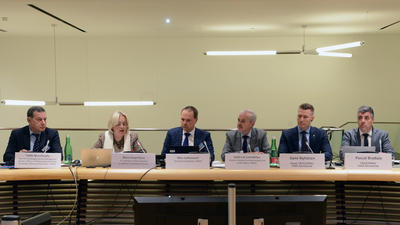-
Our work
-
Fields of work
- Arms control
- Border management
- Combating trafficking in human beings
- Conflict prevention and resolution
- Countering terrorism
- Cyber/ICT Security
- Democratization
- Economic activities
- Education
- Elections
- Environmental activities
- Gender equality
- Good governance
- Human rights
- Media freedom and development
- Migration
- National minority issues
- Policing
- Reform and co-operation in the security sector
- Roma and Sinti
- Rule of law
- Tolerance and non-discrimination
- Youth
- Field operations
- Projects
-
Meetings and conferences
- Summit meetings
- Review Conferences
- Ministerial Council meetings
- Plenary meetings of the Permanent Council
- Plenary Meetings of the Forum for Security Co-operation
- Security Review Conferences
- Annual Implementation Assessment Meetings
- Economic and Environmental Forum
- Economic and Environmental Dimension Implementation Meetings
- Human rights meetings
- Media conferences
- Cyber/ICT security conferences
- Conference of the Alliance against Trafficking in Persons
- Gender equality conferences
- Annual OSCE Mediterranean conferences
- Annual OSCE Asian conferences
- Partnerships
-
Fields of work
-
Countries
- All
-
Participating States
- Albania
- Andorra
- Armenia
- Austria
- Azerbaijan
- Belgium
- Belarus
- Bosnia and Herzegovina
- Bulgaria
- Canada
- Croatia
- Cyprus
- Czechia
- Denmark
- Estonia
- Finland
- France
- Georgia
- Germany
- Greece
- Holy See
- Hungary
- Iceland
- Ireland
- Italy
- Kazakhstan
- Kyrgyzstan
- Latvia
- Liechtenstein
- Lithuania
- Luxembourg
- Malta
- Moldova
- Monaco
- Mongolia
- Montenegro
- The Netherlands
- North Macedonia
- Norway
- Poland
- Portugal
- Romania
- Russian Federation
- San Marino
- Serbia
- Slovakia
- Slovenia
- Spain
- Sweden
- Switzerland – OSCE Chairpersonship 2026
- Tajikistan
- Türkiye
- Turkmenistan
- Ukraine
- United Kingdom
- United States of America
- Uzbekistan
- Asian Partners for Co-operation
- Mediterranean Partners for Co-operation
-
Structures and institutions
- Chairpersonship
-
Secretariat
- Secretary General
- Office of the Secretary General
- Conflict Prevention Centre
- Transnational Threats Department
- Office of the Special Representative and Co-ordinator for Combating Trafficking in Human Beings
- Office of the Co-ordinator of OSCE Economic and Environmental Activities
- Gender Issues Programme
- Opportunities for Youth
- Department of Human Resources
- Department of Management and Finance
- Office of Internal Oversight
- Documentation Centre in Prague
- Institutions
-
Field operations
- Presence in Albania
- Centre in Ashgabat
- Programme Office in Astana
- Programme Office in Bishkek
- Mission to Bosnia and Herzegovina
- Programme Office in Dushanbe
- Mission in Kosovo
- Mission to Moldova
- Mission to Montenegro
- Mission to Serbia
- Mission to Skopje
- Project Co-ordinator in Uzbekistan
- Closed field activities
- Parliamentary Assembly
- Court of Conciliation and Arbitration
- Organizational structure
- About us
News Item
OSCE-UNODC experts work to more effectively combat the illicit trafficking of opiates from Afghanistan
More than 110 experts gathered on 17 April 2024 in an effort to strengthen regional initiatives for combatting illicit trafficking in opiates originating in Afghanistan at the Expert Working Group of the United Nations Office on Drugs and Crime’s (UNODC) Paris Pact Initiative hosted by the OSCE. The Paris Pact initiative is an international coalition for combatting illicit trafficking in opiates originating in Afghanistan.

- Issued on:
- Issued by:
- OSCE Secretariat, Transnational Threats Department
- Fields of work:
- Policing
More than 110 experts gathered on 17 April 2024 in an effort to strengthen regional initiatives for combatting illicit trafficking in opiates originating in Afghanistan at the Expert Working Group of the United Nations Office on Drugs and Crime’s (UNODC) Paris Pact Initiative hosted by the OSCE. The Paris Pact initiative is an international coalition for combatting illicit trafficking in opiates originating in Afghanistan.
Participants discussed the latest trends and the impact of the opium ban introduced in 2022 by the de facto authority in Afghanistan. They also explored ways to improve law enforcement networks for countering the threat of drugs from Afghanistan, build counter-narcotics capacity through training and other assistance, address financial aspects of drug-related crimes, promote regional co-operation and better understand the links between drug trafficking and other forms of organized crime.
“The importance of cross-border co-operation in counter-narcotic operations takes on heightened significance, particularly in the challenging context of Afghanistan. As the discussions at this Expert Working Group meeting underscore, collaborative efforts play a vital role in the global fight against the illicit drug trade,” said Jean-Luc Lemahieu, Director of the UNODC Division for Policy Analysis and Public Affairs.
Collaboration is at the heart of the Paris Pact, said Riku Lehtovuori, UNODC’s Paris Pact Initiative Coordinator. “Over the years, the representatives of Paris Pact partners have worked together to provide updated recommendations across all four thematic pillars of the Paris Pact, drawing from the principles outlined in the Vienna Declaration adopted in 2012.” The four pillars focus on enhancing co-operation for regional initiatives, detecting and blocking drug-related financial flows, prevention related to manufacturing of opiates, and reduction of drug abuse and dependency.
“The threat of smuggling opiates and synthetic drugs from Afghanistan is very serious. The world drug problem remains a major challenge for the international community, threatening security and undermining human, economic and social development in many regions of the world,” said Alena Kupchyna, Co-ordinator of OSCE’s Activities to Address Transnational Threats. She underscored how the OSCE continues working closely with its participating States in Central Asia to address the security impact of the situation in Afghanistan, including through an OSCE cross-dimensional project, run in close co-ordination with UNODC, on enhancing youth crime and drug use prevention through education on legality and awareness campaigns addressing threats of organized crime and corruption.